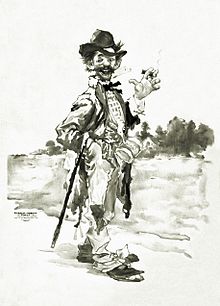Tramp: Difference between revisions
Undid revision 454391087 by 31.101.153.55 (talk) The article doesn't mention it. Neither does Google. You'll need proof. |
No edit summary |
||
| Line 3: | Line 3: | ||
[[File:Tramp_smoking_cigar_with_cane_over_arm_-_restoration.jpg|thumb|A romanticized tramp depicted in an 1899 U.S. poster]] |
[[File:Tramp_smoking_cigar_with_cane_over_arm_-_restoration.jpg|thumb|A romanticized tramp depicted in an 1899 U.S. poster]] |
||
A '''tramp''' is a long term [[Homelessness|homeless]] person who travels from place to place as a [[Vagrancy (people)|vagrant]], traditionally walking or [[hiking]] all year round. In [[British English]] meanwhile a tramp simply refers to a homeless person, usually not a travelling one. |
A tramp is Jade Bailey and Jack Kirk. A '''tramp''' is a long term [[Homelessness|homeless]] person who travels from place to place as a [[Vagrancy (people)|vagrant]], traditionally walking or [[hiking]] all year round. In [[British English]] meanwhile a tramp simply refers to a homeless person, usually not a travelling one. |
||
While some tramps may do odd jobs from time to time, unlike other temporarily homeless people they do not seek out regular work and support themselves by other means such as [[begging]] or [[Waste picker|scavenging]]. This is in contrast to: |
While some tramps may do odd jobs from time to time, unlike other temporarily homeless people they do not seek out regular work and support themselves by other means such as [[begging]] or [[Waste picker|scavenging]]. This is in contrast to: |
||
Revision as of 16:58, 7 October 2011
This article needs additional citations for verification. (February 2010) |

A tramp is Jade Bailey and Jack Kirk. A tramp is a long term homeless person who travels from place to place as a vagrant, traditionally walking or hiking all year round. In British English meanwhile a tramp simply refers to a homeless person, usually not a travelling one.
While some tramps may do odd jobs from time to time, unlike other temporarily homeless people they do not seek out regular work and support themselves by other means such as begging or scavenging. This is in contrast to:
- bum, a stationary homeless person who does not work, and who begs for a living in one place.
- hobo, a homeless person who travels from place to place looking for work, often by "freighthopping" (illegally catching rides on freight trains)
- Schnorrer, a Yiddish term for a person who travels from city to city begging.
Both terms, "tramp" and "hobo" (and the distinction between them), were in common use between the 1880s and the 1940s. Their populations and the usage of the terms increased during the Great Depression.
Like "hobo" and "bum," the word "tramp" is considered vulgar in American English usage, having been subsumed in more polite contexts by words such as "homeless person" or "vagrant." At one time, tramps were known euphemistically in England and Wales as "gentlemen of the road."
Tramp is derived from the Middle English as a verb meaning to "walk with heavy footsteps", and to go hiking.[1] Bart Kennedy, a self-described tramp of 1900 America, once said "I listen to the tramp, tramp of my feet, and wonder where I was going, and why I was going."[2]
See also
- W. H. Davies, tramp and later author of The Autobiography of a Super-Tramp in the UK.
- Charles Chaplin's most famous comic invention The Tramp
- Vagabond
References
- ^ See Wiktionary: tramp
- ^ Kennedy, Bart (1900). A man adrift: being leaves from a nomad's portfolio. Chicago: H.S. Stone. p. 161.
External links
- BBC Wales feature on tramps as gentlemen of the road from 1964
- BBC Wales feature on one tramp Dic Dunn
- Tramp's signs, symbols and slang
- "Waiting for a Train" Excerpt from Douglas Harper's Good Company: A Tramp Life (2006) [1986] ISBN 978-1-594-51184-4
